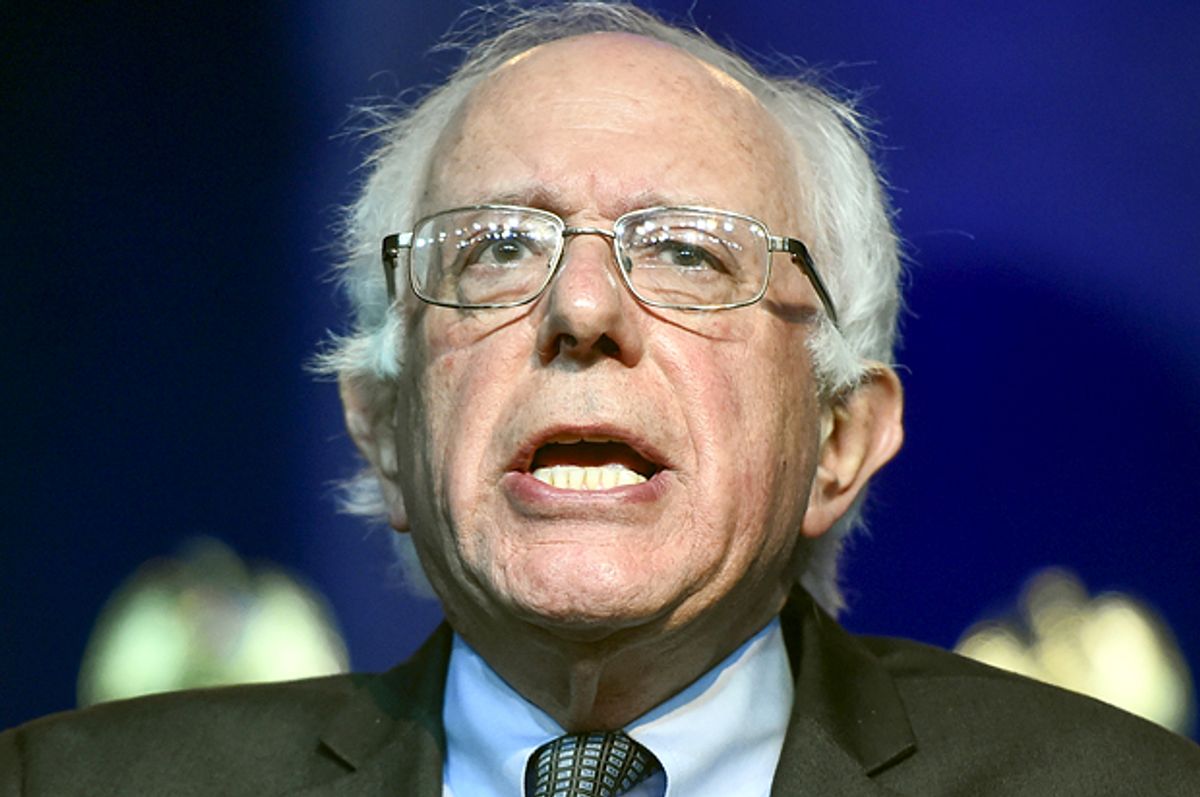I watched Bernie Sanders’ speech at Liberty University on Monday with mixed feelings. On the one hand, Sanders is a good, if a little stilted, public speaker. He is energetic and passionate. In his slightly rumpled clothes and with his snow-white hair coming more and more undone as he speaks, he comes off as sort of a cross between an old political science professor and Howard Beale.
On the other hand, I questioned whether it was worth the time and effort for a leftist like Sanders to speak to an audience that likely leaned so far to the right it was in danger of tipping over the starboard rail. What possible common ground could a politician of the left find with a crowd at ground zero of the conservative evangelical movement, a university founded by the Rev. Jerry Falwell that teaches creationism in its biology classes?
As others have noted, Sanders took a very smart approach. He acknowledged at the outset that he and the crowd would not see eye to eye on issues such as gay marriage and abortion rights. Then he challenged the crowd of Liberty students and faculty to look at the issue dearest to him, economic equality, through a more progressive lens. He asked them to imagine a world in which Americans, no matter their religion, see combating poverty and the inequality of the New Gilded Age as a moral necessity.
It was a good speech and Sanders is to be commended for giving it in a place that most liberals wouldn’t go near. It also highlights one of the weaknesses of Sanders as a candidate so far, which is his predilection for bringing every issue back around to his populist views of economic justice. But he glides past issues he cannot fit easily into this frame, even when doing so should be a snap. We saw this in his initial responses to the Black Lives Matter protesters who showed up to disrupt his speeches at Netroots Nation and other places this summer.
This shortcoming jumped out when Sanders sat for a post-speech Q&A session with David Nasser, Liberty’s senior vice president for spiritual development. One question, which got the loudest and longest sustained ovation of anything said into a microphone on Monday, is worth reprinting in full:
“You’ve talked in your campaign about how it’s immoral to protect the billionaire class at the expense of the most vulnerable in society – children…A majority of Christians would agree with you but would also go further and say children in the womb need our protection even more. How do you reconcile the two in your mind?”
The problem with the question as constructed is that it demands we accept an antiabortion framing that completely ignores the right of women to have agency over their own bodies and reproductive decisions. There are a number of good answers Sanders could have given here from a liberal perspective that would have made that clear. Probably none of them would change the minds of the evangelical Christians in the audience, which is why I wish he had not picked one that sounded like an effort to mollify the antiabortion sentiments of the crowd.
Access to abortion, as Jesse Berney points out over at Rolling Stone, “is an economic justice issue too. Wealthy women can get abortions, but for the poor they’re often out of reach.” Sanders could have pointed out explicitly the obvious economic drawbacks of forcing women, particularly those in the struggling working and middle classes, to carry unwanted pregnancies to term. He could tie this view to his call for more spending on programs for the poor, or for more progressive, family-oriented policies such as paid maternity leave or access to family-planning services, all of which help build and maintain stable families across society.
Instead, he tried putting his view on the issue in a conservative frame: “I do believe that it is improper for the United States government or state government to tell every woman in this country, the very painful and difficult choice she has to make on that issue…Very often conservatives say, you know, get the government out of my life. I don’t want the government telling me what to do.”
He did eventually tie his answer into Republican budget cuts to Pell grants for college students and nutrition programs for pregnant women and their children. Then he pivoted back around to complaining about the budget giving tax cuts over the course of 10 years to the top two-tenths of 1 percent of wealthy Americans, which seems to be where he often ends up when talking about any topic. But by implicitly accepting the wording of a question that left women completely out of the abortion equation, Sanders played right into the antiabortion crowd’s worldview.
Americans look to their presidents to spin a narrative about the life of our country at a particular moment in time. Sanders’ narrative about the growing inequality in our country rings true to people across the political spectrum, and that is reflected in his rising poll numbers. But not every issue fits neatly into this story he is trying to tell. The best politicians learn how to make it fit, so that everyone, even nominally hostile audiences, understands the stakes for the nation.
If Sanders figures out how to incorporate divisive issues like abortion rights into his larger story about the economic struggles of the 99 percent, he’ll be an even more formidable candidate going forward. If he doesn’t, he’ll likely peak very early in the primary season. That would be a shame.


Shares